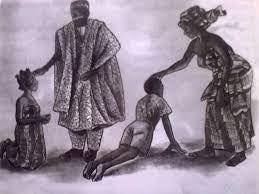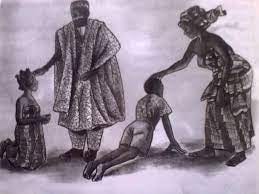This is post #7.
We acknowledge the Almighty OLODUMARE. The one who is ÒYO ÌWÀ (the Creator of Existence) and salute every man, woman and child.
We salute the home-born and the stranger - Ìbà ọ!
In our last post, we examined the first of the eight attributes of an Omoluabi - Oro siso (sound speech)
Over the next while, we will spotlight these other attributes. They are as follows:
Oro siso (sound speech),
Iteriba (respect),
Inu rere (good mind toward others),
Otito (truth),
Iwa pele (gentle conduct),
Akinkanju (bravery),
Ise sise (diligence) and
Opolopipe (intelligence).
Iteriba (respect) is an important aspect of the Yoruba culture. It is an integral part of our societal life.
As someone rightly put it, respect is that glue that hold warm relationships together.
In the Yoruba society, parents teach kids at an early age about respect, it is in our culture. A true Omoluabi embodies and models respect to the old and to the young.
In our culture, boys prostrate to greet an elder, we call that (idobalę) and the girls kneel (ikunlę) to greet elders. It is not in our culture to stretch out our hands to shake elders. The least one should do is bow one’s head in salutation.
Idobale kii se iwa, sugbo o suwon
Reverential greetings is not the ultimate of the suite of character but it is expedient
In our conversations, the manner in which pronouns are used also radiate respect for the Omoluabi person.
To us respect is not just earned but can also be demanded when occasion calls for it.
As Omoluabis, we do not spare the rod in order not to spoil the child.
Elders demand and deserve respect in our society, it is not just a matter of choice.
An Omoluabi does not wait for it to be demanded before giving it to both young and old and that is why we are the cultured people, paragons of excellence in character.
In the gathering of elders, a younger person speaks when asked to speak and even take permission from elders before speaking in proverbs and unless given the go-ahead he/she must keep mute.
"Agbalagba kin se langbalangba"
An elder does not do things that will ridicule him/her.
Now in as much as we give great respect to both young and old as Omoluabis, and as our elders are held in high esteem, they are also required to carry themselves with wisdom, grace and integrity that is why we say "agbalagba kin se langbalangba" an elder does not things that will ridicule him/her.
Respect is the hallmark of our tradition.
It is obligatory, it is imbibed in us at a very young age as Omoluabi.
Iteriba (respect) is another attribute of a real Omoluabi.
May it be well with us today and next - Àṣẹ Wàá!




